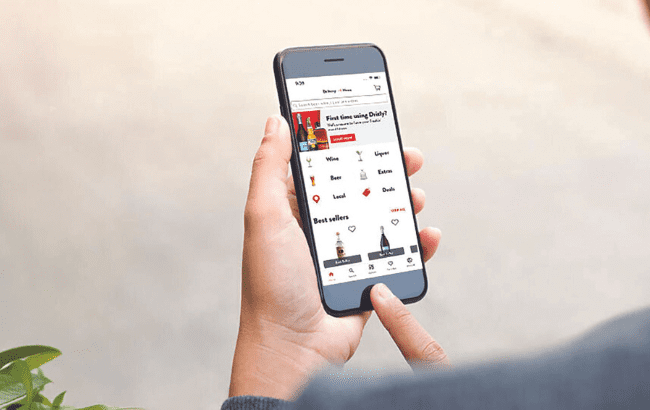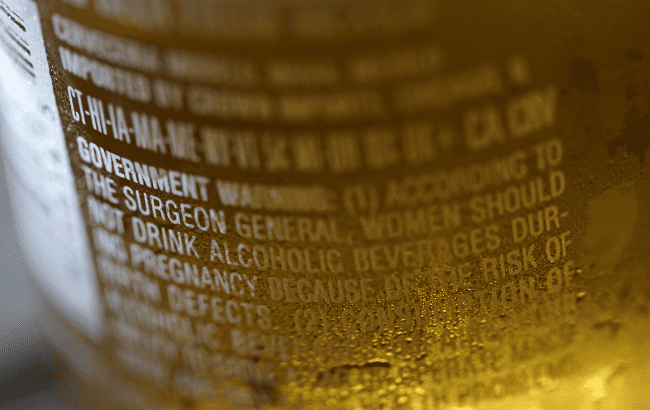The big interview: IARD CEO
Henry Ashworth, CEO of the International Alliance for Responsible Drinking, tells The Spirits Business why following data is vital in promoting healthy outcomes.

It is imperative to respect those who choose not to drink alcohol, whether for cultural or personal reasons – or simply because they just don’t like the taste. However, for many adults, moderate alcohol consumption, whether in the form of beer, wine, or spirits, is an important part of enjoying life.
From time to time, studies are published warning there is ‘no safe level’ of alcohol consumption, only to be refuted the following week with a contradictory report, and so the cycle continues – all the while, holding hostage the alcohol-and-health debate in the middle. It’s an age-old argument, but for Henry Ashworth, the science is crystal clear.
“We sit on the largest database of alcohol science, we don’t do any studies ourselves. We don’t fund any. We watch what’s coming out, and what I can categorically tell you is the science is not changing,” says the CEO and president of not-for-profit organisation the International Alliance for Responsible Drinking (IARD). “It shows people who drink moderately live at least as long, or longer than those who don’t drink alcohol, and generally live longer than those who drink heavily. That science has been around for 40 years, and has been retested.”
Informed decision
Avoiding sweeping generalisations about alcohol and health is crucial to enable consumers to make informed decisions about their alcohol intake, and to ensure they don’t lose trust in health authorities, Ashworth says. “Consumers are badly served by a debate that is causing great confusion. The UK drinking guidelines are a really good example of that. They were changed for men, not women, on the basis of breast cancer – the logic doesn’t make sense.
“The key thing is how do you help people who are drinking harmfully? That is the IARD’s whole reason and purpose, and the focus has to be on that.”
Established in 2015, the IARD comprises 12 major beer, wine, and spirits companies, including Diageo, Pernod Ricard, Bacardi, Beam Suntory, Brown-Forman, and William Grant & Sons. The organisation works towards its international goal of reducing harmful drinking through measures including supporting the World Health Organization’s (WHO) ‘noncommunicable diseases global monitoring framework’ to cut the harmful use of alcohol by at least 10% by 2025.
Before Ashworth joined IARD in 2017, his five-year tenure as chief executive of the Portman Group before that showed him the good that could come from beer, wine and spirits producers working together with a common cause. Bringing the various parts of businesses together – such as the marketing, R&D, sales, and legal departments – gives “access to tools to make a difference and make change happen”, Ashworth says.
As the digital world has accelerated, extending the efforts of its safeguarding measures to online platforms has been a focal part of IARD’s work.

Online platforms
In September 2018, the alliance partnered with four social media sites – Facebook, Twitter, Snapchat, and YouTube – to deliver ‘robust responsible marketing standards’ on the platforms.
Today, IARD works with eight online platforms. “With the explosion in growth of digital marketing, the question was, why were these companies not working collectively with social media platforms to make it easier for other companies to raise standards? The easy answer was we weren’t talking to each other. But if we can embed the standard at the platform level, it doesn’t just help the biggest 12 advertisers, it helps all the others who are struggling to use tools and put protections in place,” Ashworth explains.
These tools include helping companies that work with influencers to age-gate their social media posts, or to give social media users the ability to opt out of alcohol advertising. The IARD was able to bring together 13 leading advertising, PR agencies and influencer agencies, who agreed to global standards to ensure responsible marketing of alcohol by social media influencers – “a world-first initiative” in raising collective standards across multiple digital standards. The common goal was to protect children from being exposed to alcohol advertising.
“More people are realising that by working together we can make a difference,” Ashworth says.
He gives the explosion of e-commerce during the Covid-19 pandemic as an example. “Covid-19 came along and fundamentally changed business models for everybody. It was devastating for bars, cafés, and restaurants around the world. But e-commerce exploded. We came across colleagues in Australia who already worked with public bodies and retailers to put in place e-commerce standards. We asked if we could take their standards, share them with our member companies, and put in place global standards for e-commerce that can be taken by the government and turned into a new national code of practice. What a privilege to find amazing work being done in one country and apply it to other places.” IARD now works with more than 14 e-commerce players on six continents. “It’s not illogical either; either they recognise there’s a business opportunity if we get it right, or if we get it wrong, governments might just pass off completely,” Ashworth adds.
E-commerce standards were tested with the public health community to understand what they would like to see implemented. This has allowed IARD to effect change not just at a company level, but to make an impact internationally. Ashworth clarifies that the IARD doesn’t work at a country level, but is invited to work with colleagues in countries to tackle specific issues.

He offers the Caribbean as an example. The region has been trying to work on underage drinking, specifically on age verification when buying alcohol. “We introduced them to the Retail of Alcohol Standards Group in the UK, and Challenge 25 as a concept,” Ashworth says. Challenge 25 requires retailers to request approved forms of ID from anyone buying alcohol who looks under 25. “It’s a measure that has been incredibly successful in the UK, so it makes sense to share that information with other regions,” he adds, noting the scheme in the UK is industry-led.
There has been a long-running misconception that regulation equals “government”, but Ashworth stresses the pros of allowing independent organisations such as the IARD to influence governance through tried-and-tested data-backed measures.
“We’ve had real success helping governments and public stakeholders understand that regulation also happens in the private sector,” he adds. “When a company has contact with another company, and moves to introduce responsibility clauses in contracts with advertising agencies, for example, that’s a form of private-sector regulation. It can be powerful and effective.”
Changing behaviours
It’s an interesting time for the alcohol industry, Ashworth notes, as behaviours towards alcohol are changing – but trends are not ubiquitous. Ashworth is keen to highlight how each market has its own nuances, and there cannot be a “one size fits all” approach to tackling alcohol harm. Contentious issues that are regularly raised in the spirits trade – such as minimum-unit-pricing initiatives and ‘dark markets’, where alcohol advertising is illegal – are not as clear cut as one might think when deciding whether they’re ‘good’ or ‘bad’.
“The really important thing is any measures put in place must work and be effective according to the national context,” Ashworth insists. “We agree you can’t operate business without regulations in place, but they should allow responsible operators to thrive while stopping them from abusing vulnerable groups. The WHO clearly sets out a global alcohol strategy about tackling harmful consumption, not all alcohol consumption. We do feel a distinct difference between moderate consumption of beer, wine and spirits as part of a well-balanced lifestyle, and the harmful use of alcohol.”

Warnings on bottles
He highlights the alcohol industry’s self-starter approach to combatting harmful drinking, without the need for instructions from governments or any other regulating bodies. Four years ago, IARD members unequivocally agreed to put age symbols on products “because we believe minors should not drink”. They also elected to put anti-drink-driving signs on products, and pregnancy warnings on bottles. “That is a global commitment; it doesn’t matter whether the government is regulating for it or not, in those three areas (and it is worth noting that the science isn’t quite black and white) there is no difference of opinion between the public health community and the drinks community. What gets more intricate is what is moderate?”
Ashworth urges the trade and public health bodies to “find common ground” on what moderate means, so the “vast number of people drinking moderately can continue to do that, and benefit from leisure and social interactions, and all those positive things we know come with having a cocktail, beer, or glass of wine”.
Freedom to socialise
The Covid-19 lockdowns highlighted the social importance of alcohol-serving establishments like never before, Ashworth notes. As the freedom to go out and socialise or travel was taken away, people started to really understand that their physical and mental wellbeing was connected to who they could socialise with and where, whether they chose to drink or not. Even the WHO recognises health as both physical and mental wellbeing, not just the absence of disease. The pandemic also gave further insights into consumers’ attitudes towards alcohol. Ashworth says in time, data from the Covid era will be made public, and will show that, generally, consumption of alcohol was down during the pandemic, but unfortunately “the most harmful were drinking more and suffering more harm”.
“At all times, we have to make sure we are following data,” Ashworth stresses. “If data shows we need more targeted approaches when it comes to tackling harmful drinking, then we absolutely should do that.
“Underage drinking trends are very encouraging in parts of the world, so what’s working? The success of Challenge 25 in the UK is a great example. Binge-drinking trends are down; mortality trends were down but there’s been an unfortunate uptick in mortality since Covid and we need to understand what that was.”

Changing attitudes
So much of how we lived, worked and socialised changed as a result of the pandemic, and attitudes towards alcohol were no different. The spirits industry was spurred into action, creating new products – and categories, such as low-and-no – to cater to new demands. The pandemic accelerated the convergence of adult drinks, Ashworth says, and while it brought new players to the market “it possibly opened up old challenges”.
He recalls the alcopop hype of the 1980s and 1990s during his days at the Portman Group, and warns that the industry has to be wary. “If you think about the pressure on spirits to create lower-alcohol alternatives, non-alcoholic innovation, how do you enable innovation to thrive – which is what we want – but not inadvertently fall back into a very negative place when it comes to appealing to minors, which is, bluntly, what I think happened with the vaping industry,” Ashworth says. “Suddenly, the marketing of vapes appeals to minors.
“We are super-clear to all our members: innovation is great, whether lower- or no-alcohol, or full-strength products – fantastic. But at the same time, we must have hard-and-fast rules for the industry. These are still adult products, not for minors, and that’s a very interesting space for us at IARD as we are seeing new entrants into the market.”
Lead from the front
Ashworth says it is important for the alcoholic beverage industry to take an interest in the IARD’s work, as leading from the front when it comes to tackling alcohol harm will create a safer, more prosperous industry for all.
“The alcohol industry makes brilliant, extraordinary products, and should be massively proud of the heritage of the sector,” Ashworth stresses.
“If we want our businesses to thrive for the next 100 years, we have to show we absolutely understand the incompatibility of harmful drinking and successful business. The industry can only thrive if we’re also part of the solution.”
Related news
Dick Bradsell: lessons learned from an industry icon
